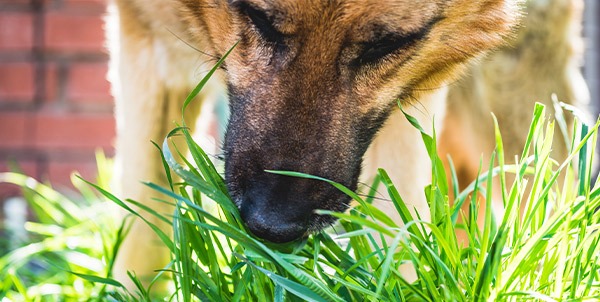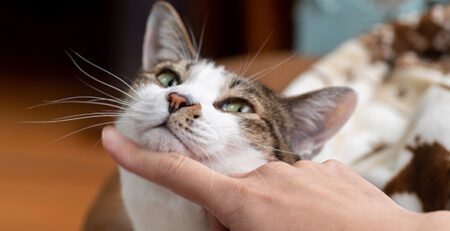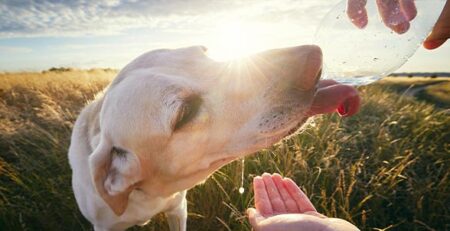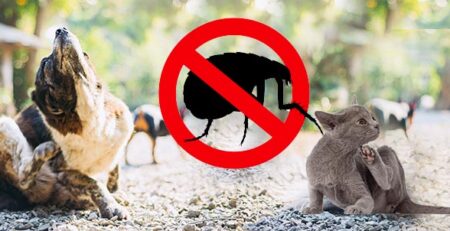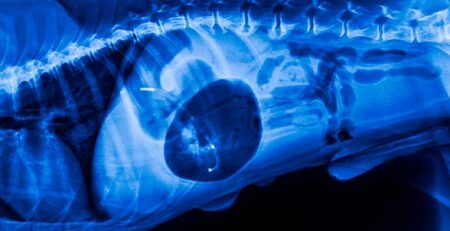Table of Contents
If your dog grazes and vomits, don’t make all the grass (that he eats) into a herd: know that at the origin of this strange habit could be quite serious pathologies. When is it appropriate to be concerned? And how to intervene?
The young, fresh herb has a very juicy and aromatic taste, and dogs eat it first and foremost because they like its flavor and texture…but not only that.
There are also other reasons behind this seemingly unusual “grazing” habit of dogs.
Did you know that animals can heal themselves with herbs?
The modern
zoopharmacognosy
, a discipline that studies the methods used by animals to cure themselves of disease through the remedies offered by nature, shows that dogs do not graze at random.
Basically, they have the ability to select plants and use certain molecules produced by their cells.
These plant molecules, called secondary metabolites, have stimulant, laxative, antiparasitic, antibiotic functions and can even act as antidotes for accumulated toxins.
Did you know that grass promotes digestion in dogs?
The dog is able to improve digestive functions, clear its stomach, purify itself, and get rid of excess stomach acid or any foreign bodies, just by ingesting the herb.
In the case of dogs, eating grass not only aids digestion but also stimulates evacuation.
In some cases, however, the herb can induce vomiting.
Why does the dog vomit after ingesting the herb?
If the dog takes in well-chewed grass, it passes undisturbed throughout the digestive tract to the intestines and is then excreted with feces.
When blades of grass are not chewed well, they tickle the stomach and cause its walls and those of the esophagus to move.
Hence vomiting, which facilitates the expulsion of undigested food or small foreign bodies such as pebbles, plant seeds or fruit stones.
Is there any concern if the dog vomits grass?
If after vomiting the dog is alert, playing, eating, sleeping and conducting its routine quietly, you have no reason to worry.
When, on the other hand, vomiting is not an occasional phenomenon but is repeated every day, and if the dog does not eat and continues to expel only gastric juices, you should consult your trusted veterinarian because it is likely that these are symptoms of an as-yet undiagnosed condition.
Did you know that frequent episodes of vomiting can be symptoms of a disease?
Frequent episodes of vomiting could be symptoms of hyperacidity gastritis, a wrong or unbalanced diet, allergies or intolerances, or the dog may have ingested an abnormal foreign body that it cannot get rid of.
In addition, pancreatitis or liver problems may also manifest through repeated and continuous episodes of vomiting.
And that the pathology may also be behavioral in nature?
Other hypotheses have been made as to why dogs eat grass, and the cause can also be traced to stress, boredom or anxiety.
Jaw movement, and therefore chewing, have very important physiological consequences:
– Increases the production of endorphins and serotonin in the brain resulting in a beneficial effect on mood
– It lowers cortisol and adrenaline levels, and this promotes a state of relaxation.
The constant grass grazing could be related to a demand for attention from your dog who feels he is considered lonely when you scold him or invite him to stop.
If the dog is trying to get pleasure or to get your attention, it means that he has a lack of it at that moment, so you should try to rebalance his emotional set-up, devote more time to him and involve him in activities that keep him engaged and fulfilled.
Always be careful what grass or plants your dog eats!
Some plants prove particularly toxic if ingested.
Avoid letting the dog run wild where Aloe, Azalea, Calla lily, Ivy, Ficus, Lily, Wisteria, Iris, Oleander, Poinsettia, Tulip, Mistletoe, Holly, Cyclamen grow.
And don’t treat your garden with chemical fertilizers, pesticides and pesticides.
If your dog’s behavior makes you suspicious, book a visit with our Staff Veterinary Doctors who are always available to assess your dog’s health status and undergo all specific examinations directly on the premises.
Please note that La Veterinaria Clinic is always open h24 every day including holidays and with First Aid service from 8 pm to 8 am.
For the joy of seeing them HAPPY.

